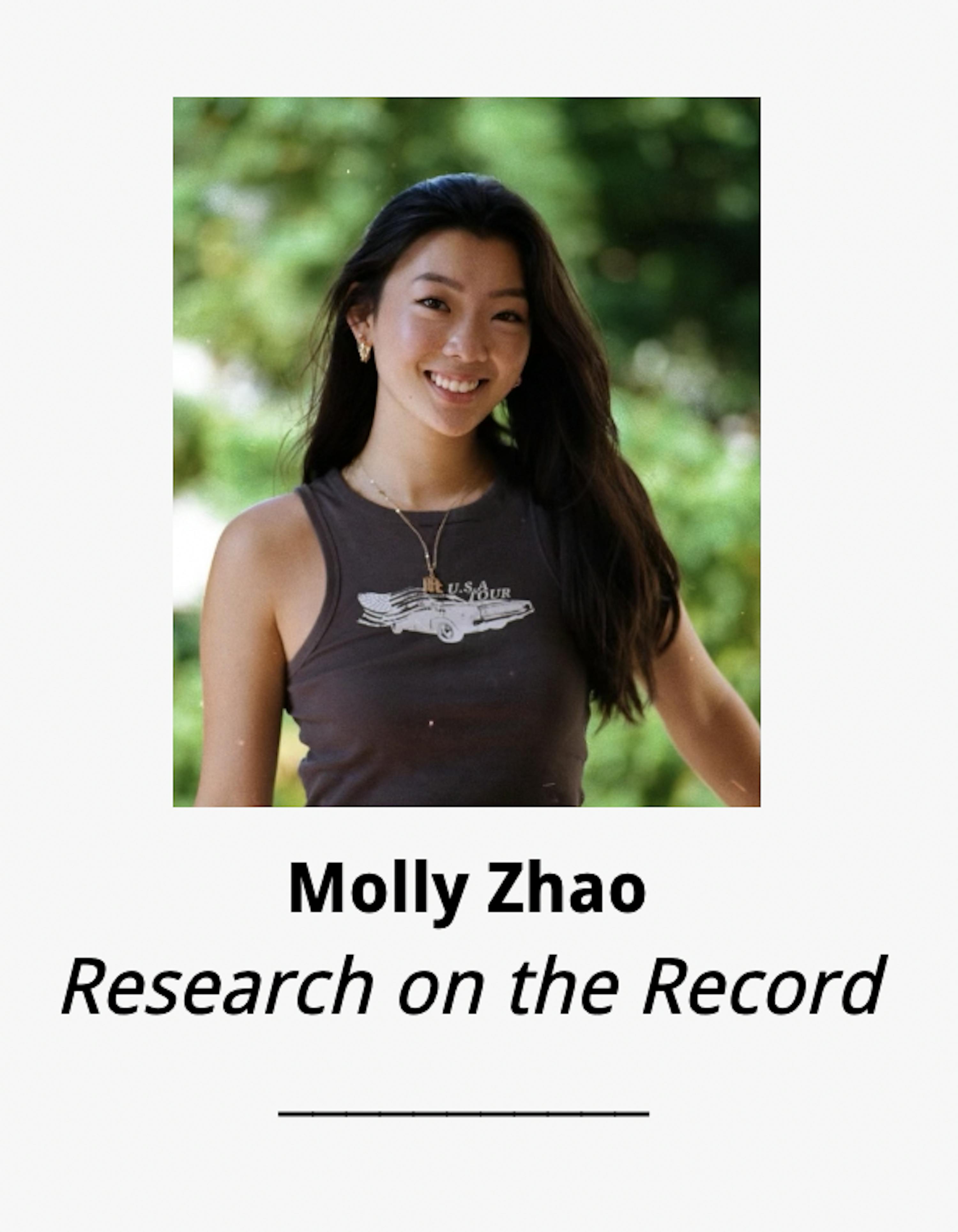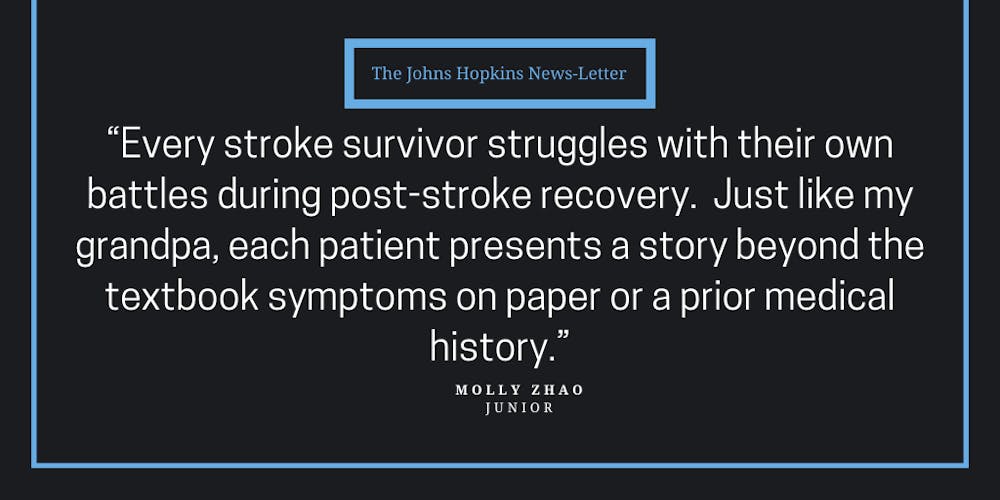
My grandpa is the most disciplined 92-year-old I’ve ever met.
It was nearly the crack of dawn on a cool summer morning. The only reason I was awake was the familiar loud rustling of my grandpa putting on his shoes before heading outside for a session of tai chi, a traditional form of Chinese meditative martial arts.
Every morning at 7 a.m. sharp, he practices tai chi for exactly one hour. Then, he promptly buries his face into the same two newspapers. As a retired journalist, he would show me the differences between a good article and a great one. Having always been surrounded by my grandpa’s sea of stacked newspapers, his love for the humanities and his constant curiosity have greatly shaped my perspectives on and interest in research.
While taking the class Cognitive Neuroscience with Professor Mick Bonner in my freshman year, I heard my future PI Dr. Elisabeth Marsh present the five guiding principles she employs while working at the intersection of stroke research and clinical medicine. I joined the Marsh Lab soon after. While I was interested in learning more about stroke, I did not understand the true complexities of the disease until the fall of 2022, when my grandpa suffered from a stroke.
Suddenly, the small tasks in my grandpa’s daily routine were not so feasible anymore. I saw him stumble while practicing tai chi, struggle to read the tiny print in a newspaper and scramble to get the correct words out when conversing.
Every stroke survivor struggles with their own battles during post-stroke recovery. While some struggle with memory or motor skills, others suffer from post-stroke depression. Like my grandpa, each patient presents a story beyond textbook symptoms or their medical history.
The Marsh Lab studies stroke treatment, stroke recovery and risk identification, placing a heavy emphasis on prevention and consistent follow-up with stroke patients. In particular, the lab highlights how strokes affect everyone differently, especially those with minor strokes. While they may not be as affected in areas such as motor skills, patients suffering from minor strokes display notable impairments in cognitive functions such as attention and multitasking, which are critical for everyday life. These cognitive challenges tend to occur irrespective of the stroke's specific location and the underlying causes remain inadequately studied.
In partnership with the University of Maryland, our lab is currently using magnetoencephalography (MEG) technology, which captures data on brain activity during various cognitive tasks, to investigate the repercussions of strokes on higher-order cognitive processes and quantify the neural underpinnings of stroke-induced cognitive impairment. I work with our lab coordinator to guide patients during these MEG sessions at one-, six- and 12-month intervals post-stroke. While administering the exam, I have the ability to see patients’ brain activity in real-time as they complete each task, which never fails to fascinate me.
I am also involved in our “Social Determinants of Health'' project, which examines how various social variables can affect a patient's follow-up rate and ultimately their stroke recovery. For example, during the COVID-19 pandemic, lower-income patients with minimal social support were disproportionately affected by the financial and physical hardships created by the virus. Considering the impact of social variables when addressing stroke recovery enables us to understand the extent and strength of a patient's support system. This allows healthcare professionals to tailor treatment plans accordingly, which works toward a future where all Baltimore communities have access to quality medical care.
For instance, if a patient lacks a robust social support network, healthcare providers may need to invest more resources in rehabilitation services or psychological counseling. This data may ultimately improve the patient's chances of a successful stroke recovery by being able to provide personalized and effective care.
Another valuable aspect of working in the clinic includes the opportunity to shadow Marsh and our two incredible nurse practitioners, Dawn Merbach and Erin Lawrence, every Wednesday and Friday. With every interaction, they take time to understand patients’ frustrations and walk through tailored treatment options to ensure the best care for the patient. Seeing Marsh, Merbach and Lawrence’s bedside manner firsthand has provided me with a clear picture of the future empathetic doctor I hope to become.
In addition to shadowing, we are able to administer the Montreal Cognitive Assessment — a screening tool to assess various cognitive domains such as language, visuoconstructional skills, conceptual thinking and orientation. Being able to interact with patients directly has taught me the importance of tailored patient care. While some patients prefer longer and more thorough explanations of the tasks, others need more pauses and breaks. Being able to decipher, and thus address, each individual patient’s needs has allowed me to gain valuable clinical skills I would not have the opportunity to learn firsthand elsewhere.
Beyond working in the clinic to provide the best quality of patient care, the Marsh Lab also places a large emphasis on mentoring undergraduate students. With students of all backgrounds and experiences working together, I am incredibly grateful to have the opportunity to be part of such a lively community that celebrates each other's successes, both in and out of the lab.
Having worked in the lab for over a year now, I’m still fascinated by the mysteries of the human brain and the neurological and biological underpinnings that allow us to recover physically and cognitively after a stroke. My personal connection to stroke patients, such as my grandfather, has provided me with a unique perspective on this research, serving as a constant reminder of why this work is so vital. Every week, I have the opportunity to make a tangible and personal impact on patients just like my grandpa. Knowing that my work both in the clinic and lab could potentially help current and future patients is the greatest gift I could ask for.
Research on the Record spotlights undergraduate students involved in STEM research at Hopkins. The goal of the column is to share reflections on the highs and lows that Hopkins students experience in their contributions to undergraduate research. If you are an undergraduate researcher interested in being profiled, reach out to science@jhunewsletter.com.
Editor’s Note, 2023: A previous version of this article contained a misspelling of Dawn Merbach’s name.
The News-Letter regrets this error.





